
Careers Features
- Details
One of the lessons of previous periods of austerity in local government is that cutting back on training budgets can create skills shortages in local authority legal teams. It is more important than ever, writes Dudley Lewis, for lawyers to have the right tools to succeed.
Let’s not pretend the next few years are going to be anything other than tough for those of us who have what should always be the privilege of serving our communities.
And let’s just face up to the fact that local authorities – the nucleus of public service delivery – will be, at turns, consolidator, protector, pioneer and, yes, bogey-man.
As for the rights and wrongs of how we arrived at the country’s most challenging crossroad since the end of the Second World War? Well, we should probably leave that to those who will wake up on May 7 with a cocktail of euphoria and hangover in their systems.
But before we all go running for the hills with a sense of collected dread, it really is worth taking stock. We live in a country in which it has become sadly fashionable to major on the negative, fuelled by parts of the media and ultimately transferred to a public who we can hardly blame for having become increasingly disengaged and disenchanted.
I heard a well-known national commentator say recently that “people in this country have switched off” (when it comes to politics and the political system). How sad, how worrying and, if true, how dangerous.
Our local authorities and those who have worked in them over the decades have made them, in many respects, beacons of what can and should be achieved by collective working within the public arena.
I am not for one minute saying everything is perfect. It’s not. But in numerous areas, our councils are centres of excellence, employing gifted, talented and dedicated people, and delivering services that are often thought to be world class.
However, the job ahead is daunting, the obstacles will be numerous and, if we thought we had seen speed of change under New Labour well, as the man said, “you ain’t seen nothin’ yet”.
Professor Tony Travers of the London School of Economics said recently that councils nearly always emerge stronger from periods of change. But where does even more change and uncertainty position the public sector lawyer? And what has happened to the lawyer in local government?
The quick answer is they are still there and providing a crucial legal role, but 20 years ago between 70 and 80% of council chief executives came from a legal background. Today, I would guess that figure languishes somewhere around the 20% mark and, it would appear, is declining. Coupled with that, it would appear there are far fewer council lawyers who are even members of their authority’s corporate management team.
With chief executive or director-level positions now just as likely to be recruited from disciplines other than the law, the local authority solicitor has been sidelined. Is that too emotive a view? I don’t think so.
The main reason we now face a problem is the lack of vocational and personal development. Of course we need career lawyers, that goes without saying but we urgently need to find a vehicle for those who may want to move away from pure specialisation. Sadly, those individuals are probably less well equipped to seize opportunities than at any time I can remember.
Many of the current skills shortages in local government are the result of council cuts to training budgets when funding was tight last time around. The focus now has to be on correcting what is wrong, developing that which is right, and having the proper talent and skills in place to address both challenges and opportunities.
In the end, our profession in the public sector has simply not responded to change. Now, regardless of whether this is our fault or the fault of a culture that demands more and more with fewer resources is open to question. What is sorely needed is a framework for the development of the local authority lawyer.
This is about attaining management skills on various levels – crucially the development of the individual, the leadership of people and teams, and in addressing the culture and demands of the political environment. There are skills within this framework which, I am sad to say, are now sorely lacking from those within our profession who aspire to their place at the top table.
There are certain functions, certain disciplines that always seem prone to greater scrutiny when times are tough. But there are also the types of business tools that if neglected during a recession, invariably make recovery all the more difficult. Training is undoubtedly one of those – and I make no excuse for being one of its most vehement champions.
This really is no time to scrimp on training budgets.
Dudley Lewis was city clerk and director of legal services at Bristol City Council, and is currently director of training at LGG – a provider of training courses and conferences to lawyers and others working in local government. www.lgg.org.uk
- Details
The threat of reduced budgets and job losses mean it is more important than ever to invest in your professional development, writes Amy Bullock.
“If we all did the things we are capable of, we would astound ourselves” - Thomas Edison
Continued professional development is exactly that. It is the ongoing development of your skills, knowledge and experience, whether in business, academia or your area of legal specialism. It is absolutely necessary to ensure that you are abreast of new legislation, market trends, changes within the macro-environment, and most importantly, you as an individual are ahead of the game in your field.
No matter what you do, there are constant advances taking place. Many will be minor, but a number will be important changes that may lead to significant developments and periods of transformation within the legal arena.
Professional development is about moving yourself to the next stage in your learning curve, ensuring that you are up to date with these advancements and preferably even ahead of the curve. If you are not you will always be playing catch up on the trends and developments in your discipline - and most importantly, you could prevent yourself from progressing within your career, and hamper the opportunities available to you. In the current climate, with the threat of job cuts and reduced budgets, you cannot afford to not be thinking ahead and planning your professional development, identifying the channels that are available to you to help you progress.
Additionally, not only can your professional development be of use to you on a personal level, but it can also benefit the organisation that you work for. A number of organisations have budget set aside for their employees' professional development and it is important that you work with your manager to plan how they can support you to achieve your personal goals, alongside their objectives. Organisations can reap a number of benefits either in terms of cost cutting or making them more competitive, by positioning themselves at the cutting edge of change. For an organisation not to address change and acknowledge developments within the marketplace can have a significant detrimental impact, leaving them behind their competition – a position that no one wants to be in.
Professional development delivers a range of benefits. These include:
Development of new skills
Professional development will enable you to learn a great deal of new skills and knowledge, allowing you to advance your abilities and grow so that you can perform more highly skilled and demanding tasks. It allows you to build specific knowledge and competencies that are related to your current role, plus will enable you to progress within your career.
Industry trends - keeping up-to-date
Keeping up-to-date with industry trends and developments will not only help you to perform your own role but also help your employer understand their position in the marketplace and can assist strategic decision-making.
Fresh Perspectives
It allows you to draw upon fresh perspectives from outside your company and role, and think about new ideas and opportunities that you can introduce into your role or department. By reflecting on these things, you can bring creative solutions, learn relevant tools and implement best practices that can be brought to your organisation’s strategy and performance. New knowledge creates real-time solutions and innovative initiatives, providing a strategy for differentiation and competitive advantage within the marketplace.
Expand horizons and explore career opportunities
With more skills and the advanced knowledge that you gain, you will begin to appreciate what your career prospects are and where your path can potentially go.
Energising and renewing
Sometimes it is a good idea to take a break to refresh your mind and put your life and career into perspective. By taking time out to personally develop, you will be taking a step away from your role to do something different – which will provide you with an energy and sense of fulfilment that will reflect positively on your career and personal life in the long term.
Networking and Continuing Professional Development
Training courses, seminars, industry and discipline specific conferences and CPD sessions - a list of channels that is by no means exhaustive, are all avenues that allow you to meet and be introduced to industry experts, leaders and like-minded individuals.
It is worth the investment of your time and money, to know exactly what is going on now and likely future developments. Learning and absorbing information from experts is always advantageous, and will place you in a stronger position.
And it for this reason that networking is so important. Word-of-mouth is the fastest disseminator of information, and networking events are where you are most likely to hear the very latest news and developments within your area of specialism - information that may take a while to circulate via professional literature or educational channels. Additionally it is a platform to address issues, through obtaining input from your professional peers who may be experiencing the same problems, and coming up with solutions that may not have occurred to you.
Building relationships like this can be extremely useful for finding out about career opportunities, work related guidance, market advancements, business opportunities and insider information.
There are a number of ways in which you can access the different channels for professional development including:
- Across the country there are a number of specialist legal training providers that hold a diverse range of events throughout the year at various locations. There is a cost involved, however, more often than not an employer may offer financial support as there will be immediate benefits that can be brought to the organisation
- Often when local authorities make arrangements to outsource work to particular private practices or barristers’ chambers they build in a CPD arrangement into the contract, offering free CPD courses as a value add to employees
- A number of specialist legal recruitment agencies, including Sellick Partnership, offer free CPD to their candidates and clients as part of their value added service, providing both a platform for career development and networking.
Amy Bullock is manager of the Legal Division at Sellick Partnership Yorkshire.
- Details
With local government lawyers heading to York next week for Solicitors in Local Government’s annual Weekend School, we ask Guy Goodman, the group’s present chair, how the organisation can help its members through what promises to be a turbulent period.
What do you see as the main challenges facing local government lawyers?
I have concerns about shared services if it means that people begin to see the cost of everything and the value of nothing. I will never believe that legal services is a back office function or merely transactional – the role of the lawyer in local government is very central to the delivery of services and the vibrancy of the organisation as a whole. The legal department is like a corporate glue in terms of governance, standards and ethics, decision making and I think that you separate out legal services from that at your peril.
This is the importance of the discussion about the monitoring officer role. I know some people see this as an albatross around lawyers' necks, but I do not see it that way. I have always seen the role as a facilitator because the monitoring officer is one of the people closest to the decision-making process and it is by occupying that role and being seen to be enabling in that role that I think the Chief Lawyer positions his service or her service as being at the centre.
The legal department's role is about being proactive and being involved in strategic matters at an early stage. That is the difficulty with shared services – the further you remove legal services from the corporate centre and the more you regard it as simply being transactional, the later you bring the lawyers into the process. The real value of the local government lawyer is in helping to ensure that you fix the parameters of what you can do and that you help to plot the journey that your corporate client wants to make.
Some authorities may bring in shared services quite deliberately where the lawyer is seen as being obstructive or difficult. This is where lawyers have to help themselves. They have to have the right mindset and to move away from being seen as being difficult or awkward. We can't just be the people who are seen to say 'no' all the time; we have to be the people who say ‘yes’ and find solutions to problems.
The driver for much of this is the budget cuts that many legal teams are being subjected to and we have to be smarter about how we run our departments in this environment. In particular, we need to strip out some of the administrative stuff that other departments can do and focus where, as a lawyer, we can add value.
We need to look at how our teams are constructed. When I was head of Adult Social Services and Children’s Services, I had a top-heavy team of lawyers with very little support, so we had these very expensive resources doing a lot of routine matters. What we did was we brought in a layer of legal assistants, and devolved work to them. You do not need a solicitor to do every part of a legal process.
We have become better procurers of legal services, but I think sometimes again we have to help ourselves. The problem with long-established panels is that the people on them become complacent and we need to disturb that complacency from time-to-time. We need to be smarter procurers and go outside our comfort zones sometimes. For example, particularly for a unitary authority, you should be building your capacity through skills transference from your private sector partners. If you are paying significant fees to an external firm for a PFI, I would expect to have some skills transference back in return, thank you very much.
Perhaps another danger that local government lawyers face is over-specialisation. One of the attractions of local government is that the variety of work available is almost limitless and my advice to people I have recruited over the years is not to do one area of work forever. If you want to specialise, then try to develop at least two specialisms. But I do think that this is becoming more difficult to achieve.
What people tend to forget is that local authority lawyers have already proved to be remarkably adaptable over recent years and we are still flourishing. The key to the future for local government lawyers is to develop the skills and knowledge that will enable us to adapt to the changing environment and to develop new roles for ourselves.
For example, if you look at Alternative Business Structures, SLG were initially quite concerned about the impact that might have, but on reflection, we couldn't find many good reasons why a local authority should not enter the market place. There may be areas where the High Street has abandoned ordinary folk either because they have not got the specialists or because of the geography. One of the SRA's models in its consultation exercise was a local authority setting up its own practice and entering the legal services market place. We could not see an objection in principle. That would inevitably change the nature of the role of the in-house lawyer, and that is something that we will have to proactively deal with.
How can the SLG help?
The role of the local government lawyer is increasingly about building relationships and being part of a team. It is about being creative and prepared to tackle new challenges not merely being a legal technician. We are continuing to push the message to our members that these are the sort of soft skills that you need.
Another important part of our work at SLG is to develop our knowledge network. SLG is a large network of very experienced practitioners of all shapes and sizes and an important role for us is to tap into that knowledge base and to share it amongst our members. To that end, when we redeveloped our own website back in September 2008 it was built around the knowledge network component and we entered a three-year deal with Sweet & Maxwell to have exclusive right to provide some their product.
That is why we work so hard to increase participation at a local level. We have some terrific branches like Yorkshire and The Humber, Northern, North West and North Wales and West Midlands which are examples of really good practice. But there are other areas which are still developing and the challenge for us to make sure that we have a local presence in all of our areas and that we are pulling in 30 to 40 people to our events.
What is the future for SLG?
In some respects, the new website was about trying to redefine what SLG is. We operate in a very different environment to when I first started in local government 20 years ago.
The landscape for SLG I think has changed significantly and is continuing to change. The old model of a membership organisation that effectively is the only group that is catering for its membership has changed. We are competing in the market place, not only to a degree with our sister organisation ACSeS, but also with all those firms wanting to have local authority business and those who are already provide services for local authorities through panels and who are offering added value services.
SLG realised some time ago that working in partnership with other organisations enhances the SLG brand and adds value to the offer that we can make to our own members. So where we can we will try to work in partnership.
One thing you learn as Chair of SLG is that you have the stewardship for one year and what is really important is that you ensure that there is some continuity of thinking and plans of action, otherwise what you have is a sort of stop-start. Therefore, I have developed with my Vice Chair, Steve Turner from Hull City Council, and the rest of our National Executive Committee a three-year plan to ensure that we have a viable organisation in the future.
The other challenge is to increase our persona as a national organisation and we are very much trying to bring together a group of people to work on those national issues so that the burden does not fall on a small group of office holders.
In the main SLG is in good heart. We continue to be supported by the Law Society financially for most of our running costs which is greatly appreciated and we have a very, very good working relationship with them.
They have come to appreciate the fact that we are probably better placed than they are to know what our members want and to deliver that. They have realised that working in partnership with us is a good thing. We had the joint consultation with the Law Society last year on Chief Legal Officers which I thought was a well-run exercise and we have agreed with the Society that when the opportunity comes to push on those issues in the future we will continue to do so, so it was a very useful exercise. We are very keen to work in partnership with them. It is a good relationship that we have worked on and I think we are well respected.
However, what I would like the Society to do more than anything else is to watch its rhetoric and to stop thinking and talking solely about law firms. It is important for it to remember that there is a vibrant employed sector. Sometimes it is the softer things that are really important.
Why have you made pro bono such a focus of your time as Chair of the SLG?
Pro Bono is not an area that local government lawyers do a lot of work on, and the question was: why not? I think a lot of it is that we have always been frightened of potential conflicts of interest and perhaps also the view that working in the public sector means that we make a contribution already. What we are trying to do is debunk those myths, saying there is pro bono work that does not involve conflicts of issues. You can do work for smaller charities, small organisations, you can do online advice, you can do the public education talks so there are lots of contributions that can be made. We have got lots of skills that we can add to that mix.
We have developed a partnership with LawWorks and agreed one with Lawyers for Schools where we are going to have a local government lawyers in schools initiative funded for three years by the Trust, supported by the Citizen Foundation. We are going to set up three sites throughout the country where we will bring together local government lawyers to deliver Lawyers in Schools, teaching law modules to 14-15 year olds in deprived schools. It is a really, really good initiative.
There is no reason why employers should not see pro bono work as being a development opportunity for their staff which has the added bonus of value for money and provides a beneficial way of getting CPD. We need to educate employers, heads of legal and also our own members to say this is something you should be thinking about pushing for – even if it is an hour a month or a couple of hours a month.
But, it is one of those issues you have to keep chipping away at. There are no miracles going to happen overnight, it just takes damned hard work.
What is SLG’s view in the practising certificate (PC) fee debate?
The Solicitors Regulatory Authority’s decision to introduce a 60/40 split in the PC fee between firms and individuals is welcome news, albeit with some caveats. It is long overdue that the burden of the PC fee should be shifted away from the in-house sector as it is clearly our colleagues in the private sector that carry the greatest risk. So while the SRA's proposals are a step in the right direction, we would like to see it closer to 80/20.
The other part of the current proposals that we are unhappy with is the contribution to the compensation fund. What became very transparent last year was that a part of the Practice Certificate fee always went to the compensation fund. So what we saw last year, for someone like me, was another unexpected £130.00 for the compensation fund – which came as a bit of shock.
We made the point that in-house lawyers don’t usually hold client money and, again, that the regulatory burden should fall on those who do. However, if we are looking at a PC fee of £400-£500, then I think that is to be very much welcomed. I will not consider the battle to be won until I see that practice certificate request fee note that says £500 rather than £1,300.
I think that will encourage those authorities that have started to think about whether they should pay the PC fee to recognise that solicitors have a professional qualification and should have a practising certificate.
Solicitors working in local government should have a practising certificate. We have worked very hard for them and, more generally, I think it is about being one profession.
- Details
It is time for local government lawyers to show they can make things happen, writes Nicholas Dobson.
Actors live in dread of becoming typecast i.e. identified with a particular kind of part. Sean Connery, for instance, once had trouble getting audiences to think of him as anything other than James Bond. He wished he were licensed to kill 007, once saying that: “I have always hated that damn James Bond…. I'd like to kill him.”
But this isn’t just an actor problem. Local government lawyers can also have difficulties in shaking off legal eagle typecasting that can sometimes feel stuck with industrial superglue: a dab hand no doubt with the heretofores but not fit to be let loose with the grown-ups. If this may feel a mite familiar – not of course for you but for a colleague, you might want to read on.
If your post is head of legal services or similar, in its nature this gives you valuable reach right across your authority's business. So whatever the departmental structures, you should be ensuring that you and yours are out there adding value at the corporate front line. For local government lawyers are pole-positioned to have a holistic handle on the entire corporate operations of the authority.
And you can do this provided you look at things through the full range of perspectives and not merely through a narrow legal prism. Add your general 'nous' or 'savvy' into the service mix and you should quickly build a reputation for helping forge sound strategic solutions as well as putting them into effect.
In short, step outside the legal comfort zone and get you and yours known for being there at the cutting edge of corporate projects. For, surprising and unfair as it may seem, authorities are not there simply to provide career opportunities for lawyers. They do of course exist to provide local leadership, governance, functions and services for those they have been set up to serve. And the stakeholder base is now increasingly broad and heterogeneous.
So as a head of legal services or strategic legal director, there will be a wide spectrum of elements to your role in addition to the formal components of your job description. Many of these will be implicit and are merely waiting for you either to make them explicit or take them on. They may include (amongst many others):
- Strategic and corporate playe
- Wise corporate adviser
- Corporate project leader
- Innovator
- Challenger
- Corporate Governance Champion and keeper of the corporate conscience
- Adviser to the Cabinet
- Adviser to Corporate Management Team
- Mover and shaker
- Departmental manager
- People developer
- Aligner of departmental functions with council strategic objectives
- Thought leader, and
- Mentor.
If you have somehow got yourself into the strait jacket of narrow legal typecasting in your neck of the woods how do you break out? The answer very much depends on your relationship patterns and credibility at both officer and member levels. If this is at dangerously low levels, a move and a fresh start may well be the answer.
But if it’s merely a question of getting an already respected lawyer respected for a wider set of skills and abilities – basically seen in a new light – then a good place to start would be to create a personal action plan and discuss this with your line manager. Appraisal time is of course good but there’s no need to wait for that. If your relations with your line manager are a little less than positive, then you’ll need to find a reasonable way of working around this without giving reasonable cause for offence.
Start to take and express an interest in corporate projects and let this be known in the corridors of officer and member power or influence. Volunteer to lead a project – and particularly one where you feel your wider skills may add value. Identify a corporate strategy need, discuss with those organizationally responsible and suggest that you lead and take forward.
However, in doing these things you will of course need to operate some skilful people handling and deft footwork generally to ensure you don't tread on toes and irritate in the wrong places. But if you acknowledge and enhance the skills of others and are seen as supportive and interested rather than just nakedly empire-building, you are generally likely to be welcomed. People like do-ers – particularly those prepared to get their hands dirty.
As to your own people, you should be seeking to develop them as holistic lawyers i.e. those who have a good understanding of the legal and constitutional basis of local authorities as well as of their own discipline but crucially who also bring a wider corporate perspective – and wear their law lightly.
In carrying out your management role, it’s healthy constantly to bear in mind the nature and purpose of your department and its place in the wider organisation and public service ecosystem. For narrow managerial territorialism will serve no-one well, least of all yourself. And it goes without saying that all senior lawyers have a strong responsibility to nurture and develop the next generation of local government lawyers.
The key is for you and all who work for or with you is to be effective and to be seen to be effective both within and outside the legal envelope as someone who will make the right things happen.
For life, human beings and human affairs are infinitely more complex than a laser beam of legal analysis might suggest. And the lawyer who can see beyond the law to encompass the broader sweep of behaviour, events and affairs and who is able to use the full range of available personal, psychological, strategic and analytical skills is likely to win a lot more favour than any of his colleagues who remain set in 'heretofore-hugging' mode.
And although your duties may include running an in-house legal practice, it’s solutions your authority will be wanting and not legal engineering. So encourage your people to apply their law like a stealth bomber whilst they’re unleashing the rest of their talents. The results may pleasantly surprise and get you talked about – positively – where it counts.
© Nicholas Dobson
Dr Nicholas Dobson is a lawyer specialising in local and public law. He is also Communications Officer for the Association of Council Secretaries and Solicitors.
This article first appeared in ACSeS' Firing Up the Passion for Leadership publication.To get hold of a copy (for a nominal £10 to cover production costs) contact the Association of Council Secretaries and Solicitors at 64, Smithbrook Kilns, Cranleigh, Surrey, GU6 8JJ; telephone: 01483 277888; e-mail:
- Details
There are few roles in a legal career as rewarding, as stimulating and as varied as being an in-house lawyer, says Paul Gilbert. To work at the heart of all meaningful policy, process and strategy in the public sector or within a business or an institution is a privilege and a wonderful opportunity to add value…But not every in-house lawyer fulfils the promise of this great opportunity. So what sets apart a great in-house lawyer from the crowd? And how can you aspire to be such a person?
I believe there are ten characteristics that are exhibited by great in-house lawyers. I base this judgement partly on the experience of working with many hundreds of in-house lawyers over ten years as a consultant to in-house teams and as a commentator on legal services generally, partly on what people now tell me they believe indicates greatness and partly on what the in-house lawyers’ own clients and colleagues tell me.
However if you know anything of my work you will also know that there will be no rocket science in the words that follow; no impossible ambition, or secrets to unlock, no magic elixir to have to discover. It is all frankly very straightforward, but in a way this is the essence of greatness; it is something that is within all of us, something that we can recognise for ourselves, but something that we cannot always fulfil.
In this short article I must apologise if the constraints of brevity somewhat belittle the tasks, but I genuinely believe that it is possible for every in-house lawyer to aspire to be considered a great in-house lawyer.
This is not a false promise, but it does rely on a kind of alchemy; for my ideas are simple constructs that are obvious to all. The challenge for you is whether you can work with them, knowing they are freely available and simple materials and then turn them into something special in your world?
The ten ideas are as follows:
- Be true to your profession: a lawyer’s duties always transcend the merely commercially expedient; you must live up to the profession’s traditions of integrity, honour and incorruptible honesty without ever wearing it as an arrogant badge that identifies your separateness rather than your inclusiveness.
- Make the simple things simple, make the complicated things simpler still: you are not paid to make this difficult, costly or prolonged. Use your skills to navigate the rocks and the reefs to find the safe but most expeditious route to a satisfactory conclusion. Be valued for not pointing out the issues, but for finding ways to resolve them.
- Understand your organisation like no other and be passionate about its place in the world: your unique value as an in-house lawyer is that no-one combines your knowledge of your business or institution with your expertise; it should ensure that your deep appreciation of the people, policies, processes and politics of your world results in advice and a service that is forensically relevant and supportive. Do this and be passionate about it too because your enthusiasm for what your business does will be infectious and encourage your colleagues to involve you at all the key moments.
- Keep commitments: commitments kept build trust. You are not valued for what you know, but for the service you provide, so show energy and direction and allow your colleagues who do not share your technical expertise to instead see value in the way that you work.
- Treat all issues on their merits and do not have favourites, do not play politics: a very significant author Roger Fisher (who wrote “Getting to Yes” among very many excellent works) once said “never be unconditionally trusting, but always be unconditionally trustworthy”. It is an elegant phrase to describe a difficult concept, but retaining an impartial perspective will help others to build trust and confidence in your judgement and will allow people to come to you with issues without fear that you will make political capital from their discomfort.
- Focus on genuine priorities: You will always be busy (probably too busy) and may never have the time to do everything that ideally should be done; so you must prioritise and focus on the things that matter the most. Remember always that relationship management is not about pleasing people, but about doing the right things against well-managed expectations. To back up your judgement therefore you must also have the means to report your priorities and to be open to the feedback of colleagues who would like to challenge how you have ordered your activities.
- Know how to pre-empt, influence and persuade: soft skills like these do not always occur naturally…not as much as we would hope they do anyway; so make sure there is time for your personal development too. Do you have a mentor? Who are your influencers and how can you learn from them? Your success will ultimately depend on your ability to carry people with you and for you to be able to influence the right course to take. These are skills you must practice and hone.
- Be a teacher, not just an oracle: it will always be tempting to be the oracle, the font of all legal wisdom; but the essence of such a role in reality is that it makes you a bottle-neck for your colleagues and is dangerously inefficient as a model for the delivery of legal services. Your challenge is to become a teacher; someone imparting knowledge so that colleagues and process take up the burden of the more routine management of legal risk.
- Make no assumptions: because assumptions are lazy and in the end can be made by anyone. As mentioned already in this article your unique advantage as an in-house lawyer is that you should have access to all key people and information in your organisation. There is therefore no need for you to make any assumptions about anything. In these circumstances as soon as one hears “but I assumed that…” One might as well have heard “I could not be bothered to check”!
- Present and communicate as if every utterance matters: being clever and engaged and thoughtful will be important characteristics of any successful in-house lawyer, but being understood is perhaps most important of all. Communication can never be taken for granted…what you say, when you say it, how you say it, who you say it to will all be critical to your success. In the end the prizes go not to who knew the most, but who could impart their ideas most effectively.
So there you have it, the essence of greatness in an in-house lawyer condensed to a few simple points. Ten ideas not one of which is out of reach for any of us; ten ideas that you can mix, match and fold into your way of working.
Ten ideas to practice your kind of alchemy as you aim to fulfil your potential.
Paul Gilbert is Chief Executive of LBC Wise Counsel (www.lbcwisecounsel.com), the specialist management and skills training consultancy for lawyers.
- Details
The vast majority of legal training focuses on technical or specialist knowledge. But, writes Geoff Wild, local government legal teams need to invest in their lawyers’ soft skills if they are really to be valued by clients.
Whether you like it or not, however good a lawyer you are is always much less significant than how good a service provider you are. Clients are becoming more sophisticated buyers of legal services, but not based on qualitative judgements about the lawyers’ legal skills.
Clients will congratulate you on things that they can see and value. They will appreciate you hitting their deadlines, keeping within budgets, working hard, going the extra mile, communicating in ways they can understand and use. They want solutions not problems; they want ease of use not clever argument; they want service not surly.
Service is therefore more important than legal expertise, there is more competition than ever before and your existing clients therefore matter more than ever before.
Are your lawyers equipped with the skills to deliver a service that your clients will value in comparison? Are they trained and developed so that they see the breadth of their role and are equipped with the soft skills they need to deliver value their clients will see and understand?
Probably not, because lawyers do not easily interpret the underlying needs or the interest of their clients beyond the legal brief; instead, they tend to work to their own agenda and in the way that suits their best interests. They work in their comfort zone, adopting a familiar style and method regardless of what the client has asked for or wants. This typical ‘we know best’ attitude is potentially patronising even when well intentioned and tends to be a turn-off even if the result can be justified as being technically proficient.
Lawyers do not always understand that knowledge of the law is not the same as providing an empathetic, client-centric service. Expertise is obviously important but it is also the expected norm for most clients (whether they are well-informed or otherwise).
So the fact that lawyers know their way around the law is never going to be a significant distinguishing factor. However, what is genuinely valued by client is a sense of thoughtfulness, of care and integrity. The appearance of the lawyer who is seen to be working hard for the client is therefore often much more prized than the end result.
The assumption lawyers often make is that the client is bound to appreciate their efforts otherwise they would not have hired them in the first place. But ‘being there’ is not enough.
The client, in most cases, is in an emotionally vulnerable position when instructing a lawyer. Going to lawyers therefore is a stressful thing to do; yet because lawyers have been there and done it, usually many times before, they at least have the wherewithal to reassure, to comfort and to encourage clients to relax and trust in the experience that is now deployed on their behalf.
Why then do lawyers invariably fail to manage the sensibilities of their clients? Why instead do they appear far too often to behave with an arrogant distain for the trust that must be given to them? Why do they not seize the wider possibilities in a client relationship? Too often lawyers seem to have a one track mind.
What they need to realise is that the business of the law is a people business where for the most part you as lawyers are a stress purchase in a world where preconceptions are nearly all negative and where the outcome is neither predictable nor cheap.
If your ability to communicate effectively, to reassure sincerely and to work hard transparently in the interests of the client is not already excellent or outstanding, then spend some time and money on it now. If you do not, you might as well be planning your retirement, because retirement is closer for you than business development is likely to be.
The ideal mode is one where wherever the client touches the legal team (secretary, admin support, trainee, legal executive, solicitor, manager or head honcho) the experience is similar. It is focused, easy to use, client centric and reassuringly good.
Train soft skills. These skills will improve your service and your client’s ability to see your service. Know what the client will value so you can add that value consistently and well. It ain’t marketing and it ain’t rocket science…it’s just essential.
Geoff Wild is director of law and governance at Kent County Council.
Page 22 of 24
Senior Lawyer - Advocate
Director of Legal and Governance (Monitoring Officer)
Assistant Director - Legal & Governance
Head of Governance & University Solicitor
Events

 Back to Basics: Construction Insurance and Insolvency - Devonshires
Back to Basics: Construction Insurance and Insolvency - Devonshires
16-07-2025 2:00 pm
Online (live)
 Institutional landlord series: Service and Notices – from Possessions to Injunctions and Requests for Access - 5 Pump Court
Institutional landlord series: Service and Notices – from Possessions to Injunctions and Requests for Access - 5 Pump Court
16-07-2025 4:00 pm
Online (live)
 HMPL Building Blocks: Tackling Non-occupation and Sub-letting - Devonshires
HMPL Building Blocks: Tackling Non-occupation and Sub-letting - Devonshires
17-07-2025
Online (live)
 To establishing whether Material Changes of Use have occurred - Ivy Legal Training
To establishing whether Material Changes of Use have occurred - Ivy Legal Training
18-07-2025 9:30 am
Online (live)
 Business and Property Masterclass #5: Interim Relief – Acting urgently and getting it right - Cornerstone Barristers
Business and Property Masterclass #5: Interim Relief – Acting urgently and getting it right - Cornerstone Barristers
10-09-2025 11:00 am
Online (live)
 Business and Property Masterclass #6: Rights of Light and Restrictive Covenants - Cornerstone Barristers
Business and Property Masterclass #6: Rights of Light and Restrictive Covenants - Cornerstone Barristers
23-09-2025
Online (live)
 HMPL Building Blocks: Service Charges & Ground Rent – Tackling Leasehold and Shared Ownership Arrears - Devonshires
HMPL Building Blocks: Service Charges & Ground Rent – Tackling Leasehold and Shared Ownership Arrears - Devonshires
14-10-2025
Online (live)
 Institutional landlord series: Possession – High Court Enforcement - 5 Pump Court
Institutional landlord series: Possession – High Court Enforcement - 5 Pump Court
22-10-2025 4:00 pm
Online (live)
 Institutional landlord series: Costs Recovery and Legally Aided Parties - 5 Pump Court
Institutional landlord series: Costs Recovery and Legally Aided Parties - 5 Pump Court
05-11-2025 4:00 pm
Online (live)
 HMPL Building Blocks: Law and Procedure Following Death of a Tenant - Devonshires
HMPL Building Blocks: Law and Procedure Following Death of a Tenant - Devonshires
09-12-2025
Online (live)
 HMPL Building Blocks: Legal Tools to Combat Anti-Social Behaviour - Devonshires
HMPL Building Blocks: Legal Tools to Combat Anti-Social Behaviour - Devonshires
17-02-2026
Online (live)
 HMPL Building Blocks: Tenancy Management – Assignment, Mutual Exchange and Succession - Devonshires
HMPL Building Blocks: Tenancy Management – Assignment, Mutual Exchange and Succession - Devonshires
12-03-2026
Online (live)



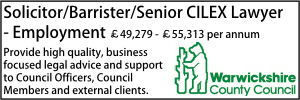


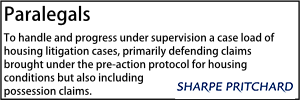



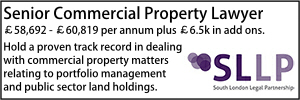
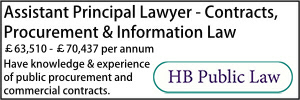
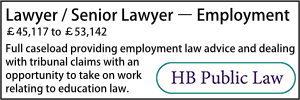


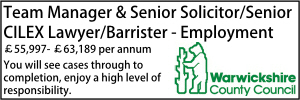
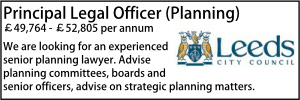
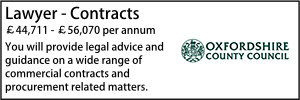

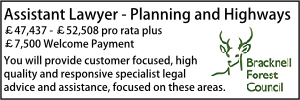
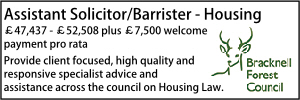
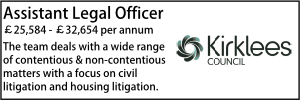


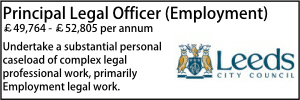
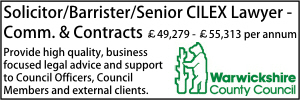
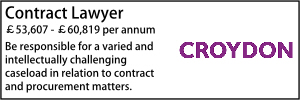
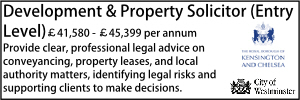



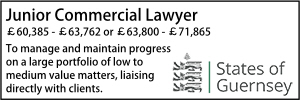
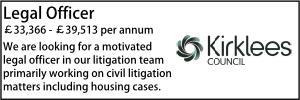

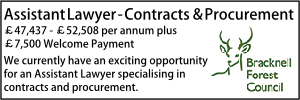

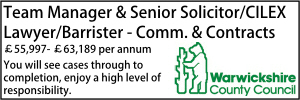


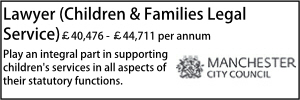
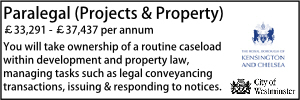
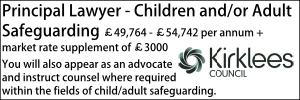
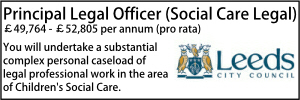

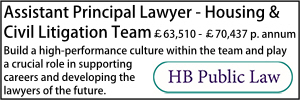




 A-Z Family Law: Take Two! - 42 Bedford Row
A-Z Family Law: Take Two! - 42 Bedford Row  Executive Programme in Public Procurement Law and Policy - University of Nottingham
Executive Programme in Public Procurement Law and Policy - University of Nottingham  Property Law Roadshow 2025 - Bristol - St John's Chambers
Property Law Roadshow 2025 - Bristol - St John's Chambers  CUBAS Comprehensive Training & Licencing (Manchester), September 2025
CUBAS Comprehensive Training & Licencing (Manchester), September 2025  AI in the Public Sector Conference - Westminster Insight
AI in the Public Sector Conference - Westminster Insight  Activism in the Workplace - 42BR Barristers Employment Law Annual Lecture
Activism in the Workplace - 42BR Barristers Employment Law Annual Lecture  DoLS Authoriser Training - LPS Law
DoLS Authoriser Training - LPS Law  Property Law Roadshow 2025 - Cardiff - St John's Chambers
Property Law Roadshow 2025 - Cardiff - St John's Chambers  Annual Fraud Conference 2025 - Oxford Investigation Service
Annual Fraud Conference 2025 - Oxford Investigation Service